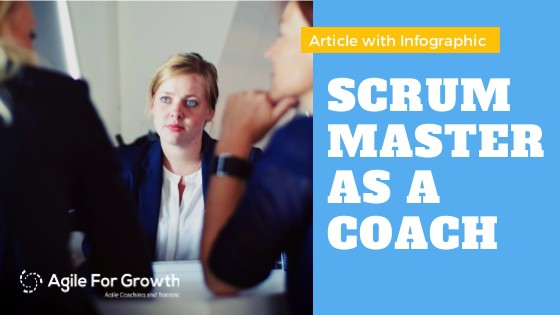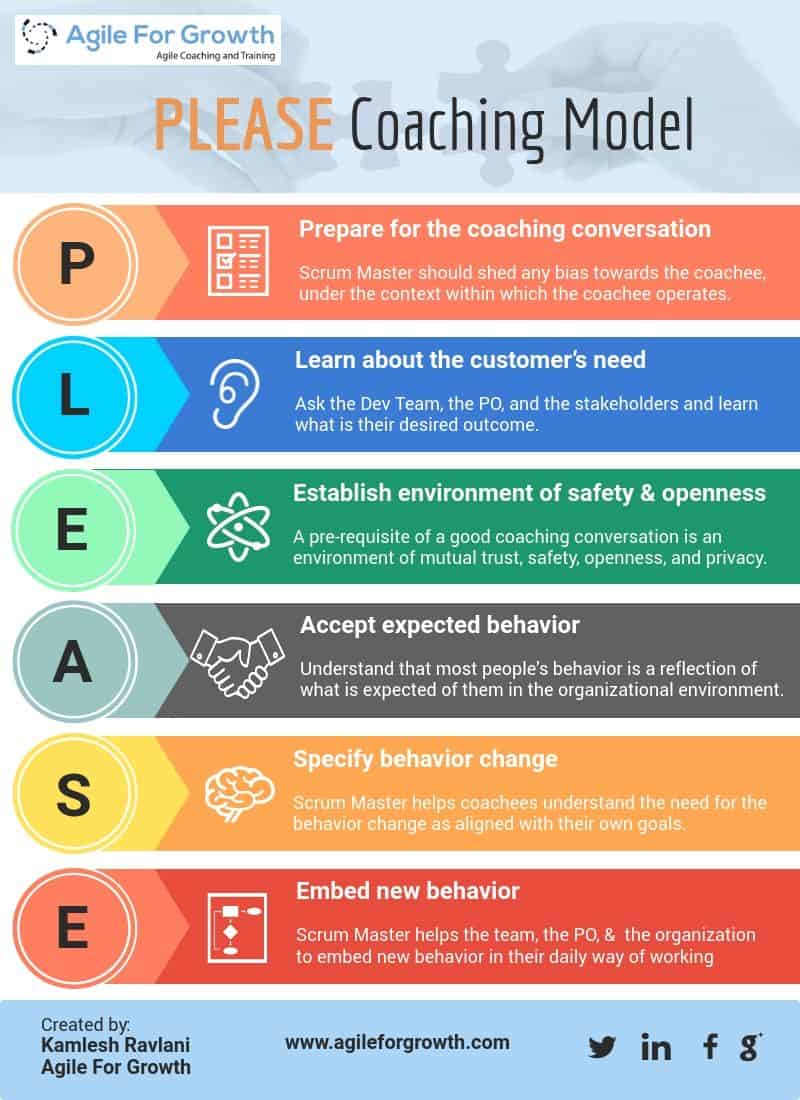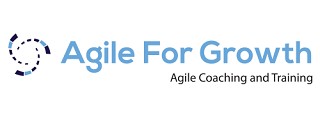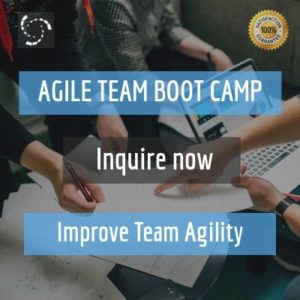
The Scrum Master as a Coach – Kamlesh Ravlani
Coaching is one of the essential skills required for a Scrum Master to be effective. Coaching along with Facilitation and Teaching skills enable the Scrum Master to be successful at their role.
The Scrum Master coaches the Development Team, the Product Owner, and the Organization. Coaching empowers and brings out the best in them.
A coach helps in unleashing a person’s or a team’s latent potential. This helps to maximize performance with the same amount of effort.
It's about empowering the people to learn to solve their own problems rather than teaching them or solving problems for them.
The Scrum Master as a coach helps the Scrum Team as well as the organization, adopt Scrum and enhance team and enterprise agility.
Jump to Topics Below:
What is Coaching | How Coaching Works | 7 Must have Skills for a Scrum Master to be a Coach | Why does a Scrum Master act as a Coach? | PLEASE - Scrum Master's Coaching Model | SCARF - Neuroscience based Coaching Model | Who does the Scrum Master Coach | Role and Responsibilities of a Scrum Master as a Coach | What type of a Coach is the Scrum Master | Difference between a Scrum Master and a Scrum Coach | Duration to become a Great Coach
What is Coaching?
Coaching is a collaborative intervention used by a coach to help their coachee(s) to improve and move forward towards a better future (improbed behavior, achieve goals, effectively handle certain situation, etc). Unlike mentoring, counseling and educating, coaching doesn't need the coach to have all the answers or to be a subject matter expert. The coach creates a structure and a safe environment where the coachee can be open and vulnerable to experiment and eventually grow.
How Coaching Works?
While coaching, the Coach helps the coachee to clarify the challenge they want to address. Staying neutral, the coach holds the structure, a safe place within which the coachee can go through the transformation.
Coachee addresses the challenge at hand. In the process, coachee develops capability and is on the way to attain a better future.
What does a Coach do?
The Scrum Master as a coach:
7 Must-have Skills for a Scrum Master to be a Coach
Below are the 7 skills that make a Scrum Master an outstanding Scrum coach:
Establishing a Trust based Relation: A pre-requisite for an effective coaching is a relationship based on trust and respect. A trust-based relation allows the coachee to be vulnerable, feel safe to discover their potential and transform to get better. In the presence of trust, team members can open up and share their mistakes. Failures become learning opportunities, and it is easy to seek help.
When people have built relationships, getting things done becomes smooth. The focus can stay on making positive progress. Collaboration becomes a natural way of working when team members enjoy working with peers.
Scrum Master achieves this is by creating an environment of radical transparency. Transparency of information improves trust.
Scrum Master ensures the Scrum values of commitment, courage, focus, openness, and respect are embodied and lived by the Scrum Team. Scrum values foster trust among all.
The Scrum Master acts as a bridge to establish trust based relationship.
Generative Listening: The success of all coaching conversations depends on the ability of the coach to listen deeply.
It requires practice to listen to what people say. But to be able to listen to what is, it takes a whole lot of letting go. Such as shedding the internal biases, personal agenda, the need for winning, and silencing the inner self. This level of listening requires being in the moment.
The coach with an open mind listens to what is being said and strives to understand the deeper meaning and emotions behind those words. By being open the coach allows for the future possibilities to emerge.
Generative listening is listening with a purpose to serve, it has empathy, openness and allows possibilities to emerge.
Let's think for a moment. You are the Scrum Master coaching a Manager. You carry an internal bias about this person's attitude, their management style, and have a preplanned agenda you would like to push.
Will you be able to effectively coach this manager?
Irrespective of this manager's willingness to learn, the coaching intervention will not help the manager, if the coach isn't listening.
The Scrum Master allows space for the coachee to talk and discover her capabilities. To come up with answers and solve their own problems. This allows the coachee to sustain their growth and accomplish highest future possibility.
Powerful Questioning: The Scrum Master uses powerful questions to fuel coaching conversations. The Scrum Master learns and practices this art of asking questions.
What makes a powerful question?
A powerful question is unbiased, clarifying, open-ended, inviting, challenging, solution focused and empowering.
By moving away from telling, answering and solving, the coach takes a stance of asking powerful questions.
Find dozens of powerful coaching questions I've posted on my Linkedin and Twitter profiles.
Leading by Example: To be able to earn trust and influence others, the Scrum Master must exhibit behaviors that she so desires from her coachees. A good coach has a learning attitude, welcomes feedback, continuously works on improving herself, is flexible and is comfortable to experiment and fail.
If the Scrum Master isn't a servant leader herself, will she be able to effectively coach the organizational leaders to become servant leaders?
The Scrum Master by practicing agile mindset instead of simply preaching it inspires others to continuously improve their agility.
Focusing on the Present: What helps people move forward and make progress is living and acting in the present.
It’s not uncommon for many people to carry the baggage of negative experiences of past with them. Such baggage not only drags them down from moving forward but also usually prevents them from trying new things. On the other hand, you’ll also find people living in the fantasy world of future, having grand plans which try to perfectly lay out everything. Most assume that everything will be awesome one day – by itself.
A good coach lives in the present and helps the coachee make the best of the opportunity at hand, accept the present and adapt to the situation at hand by taking action in the now.
Acknowledging the coachee as Whole and Resourceful: This comes from Co-Active Coaching approach that emphasizes that – People are inherently whole and resourceful. They don’t to be fixed. If the Scrum Master accepts this she will be able to allow the coachee the freedom and empowerment to find their own solutions. She challenges constructively, provides structure, constructive feedback and avoids criticism.
Being a Servant-leader: The Scrum Master as a Servant Leader operates from the stance of serving others. Serving the Scrum Team is an essential responsibility of a Scrum Master.
The Scrum Master is a Servant-Leader for the Scrum Team - Scrum Guide
The Scrum Master models servant-leadership behavior that inspires others. She focuses on serving team's agenda and not own agenda. Her objective is to be able to serve her people, empower them and help them build the capability to deliver the best they possibly can.
Why does a Scrum Master act as a Coach?
The Scrum Master is responsible to help the team grow to be a cross-functional and self-organizing team and derive maximum benefits of adopting Scrum. Moving from traditional functional silos and top-down driven teams to cross-functional and self-organizing teams requires a major shift in the behaviors of people, in the organizational structure as well as culture.
Coaching is the best intervention to accomplish deeper and sustainable change in the way people think and behave.
The Scrum Master brings a thorough understanding and practical application of the Scrum values, the Scrum framework and its rules. This knowledge and experience informs the Scrum Master to identify the most appropriate intervention for the context. Coaching being one of that intervention in the Scrum Master's toolbox.
While the Product Owner is responsible for improving ROI through Product direction, the Development Team is responsible for translating the Product Owner's vision into working product and delivering high-quality product increment, the Scrum Master is responsible for building the capability within the Scrum Team to maximize the value it can deliver.
Since the Scrum Master is not responsible for product direction, delivering the product and people management, she can observe the action on the ground as well as step back to view it from a 30,000 feet view. Allowing her an opportunity to bring back observations and insights which may be blind spots for the team.
If the Scrum Master observes the Scrum Team derailing from any of its own goals, she can help them get focused and quickly help them channelize their effort to reorient the Scrum Team toward meeting the bigger organizational goal.
PLEASE - Scrum Master's Coaching Model
From my experience coaching Scrum Teams, I've distilled my coaching approach to a simple 6 step model. I've termed this Scrum Master's Coaching Model as PLEASE model. The PLEASE model is simple and helps me prepare everytime I'm starting to coach a new Scrum Team. It also helps me stay oriented to serve the team. The PLEASE model is:
Prepare for the coaching conversation - Scrum Master should prepare before for the coaching conversation. Be open, shed any bias towards the coachee, understand the context within which the coachee operates. Come to the coaching conversation with full enthusiasm and positivity.
Learn about the customer’s need - Ask the Dev Team, the PO, and the stakeholders and learn what is their desired outcome. What positive future they intend to create. Most coaches miss this aspect and jump straight into solving problems they see on the surface. Avoid the trap of being and showing yourself as busy.
Not all running is reaching.
Understand the desired destination first, before you start running towards it.
Establish the environment of safety and openness - A fundamental pre-requisite of a good coaching conversation is an environment of mutual trust, safety, openness, and privacy. It's an unspoken contract between the coachee and the coach. It is the responsibility of the coach to establish such environment before the coaching session begins. Only when the coachee feels safe enough they will open up and take the position of vulnerability which paves way for their further growth.
Accept expected behavior - A major portion of Agile Coaching involves helping people bring a change in their behavior. Before starting the behavior change, understand that most people’s behavior is a reflection of what is expected of them in the organizational environment. People mostly Accept the current behavior of the team members, the PO and people within the organization — Before starting the behavior change, you must first, without judgment, accept that the current behavior of team members and managers is mostly a reflection of the expected behavior in the current organizational environment. Simply stating a particular behavior is not Agile will not help your coachees. Help them see their behavior from a different angle and let them decide what they would like to do the same.
Specify behavior change - Accepting the current and expected behavior does not mean, your coachees should continue with the same behavior. The Scrum Master helps coachees understand the need for the behavior change as aligned with their own transformation goals.
I was the new Scrum Master for Pluto team. The developers on this team would not mind if any stakeholder would come up to one of the team members, pull them out and assign them random tasks. They would miss a story or end up working extra hours to finish the sprint plan. Surprisingly they will not bring up this at the Sprint Retrospectives either. At the end of one retrospective, one team member asked for my input when they missed delivering two stories. I asked if this was of interest to any other team member as well - most showed interest. We agreed to have this discussion with the team the next day.
I invited them to take a couple of minutes and self-assess the team on how they were doing on the Scrum Values.
They were quick to come back with observations stating "We need to show Courage and stay Focused on delivering the Sprint Goal." I supported their observation while emphasizing that it was essential that every team member ensured that they followed all the Scrum values well.
Embed new behavior - It helps the team, the PO, and other people within the organization to embed new behavior in their daily way of working. The Scrum Master may facilitate the same. Hold the people accountable to continue making efforts. Challenge them if they slow down or feel exhausted as the new behaviors may require additional cognitive processing and discipline. The team may need a couple of reminders and bit of experiences that embed this new behavior. Like any change, make this change small and incrementally build up.
I like the PLEASE coaching model for its simplicity and effectiveness. What's important is that it works for me.
I've refined it over the years to be simple yet powerful.
If you are a Scrum Master and would like to use the PLEASE model in your coaching, give it a try. Feel free to reach me with your experiences applying it.
There are other coaching models that the I've applied based on the need and context.
The coaching approaches I like the most are:
- Co-Active Coaching Model by Henry and Karen Kimsy-House
- Emotional Intelligence Based Coaching by Daniel Goleman, Richard Boyatzis, and Dan Siegel
- Theory U and Presencing by Otto Scharmer and Peter Senge

Three central ideas of the SCARF model are:
1. The human brain treats social threats and rewards with the same intensity as physical threats and rewards (Lieberman, & Eisenberger, 2009).
2. The capacity to make decisions, solve problems and collaborate with others generally increases under a reward response and decreases by a threat response. (Elliot, 2008).
3. The threat response is more intense and more common. It often needs to be carefully monitored + minimized in social interactions (Baumeister et al, 2001).
The role and responsibilities of Scrum Master as a Coach
What are the responsibilities of a Scrum Master as a Coach? The Scrum Master supports and enables the dev team, the PO, and the organization through coaching to deliver the highest value to the customers, improve the ROI and develop adaptability within the organization.
Let's explore how does the Scrum Master coach each of the roles?
Scrum Master as a Coach to the Development Team:
The Scrum Master may spend significant time and effort coaching the development team. More so where serving a team new to Scrum.
The Scrum Master coaches the development team to accomplish these four outcomes.
Self-Organization:
The Scrum Master coaches the development team and the organization to transition from top-down and externally managed to a self-organizing team. The Scrum Master helps develop this vision of Self-Organization within the team. The SM creates an environment within which the team members can try smaller experiments to move towards self-organization.
During this transition, the Scrum Master must protect the development team's boundaries. Protecting team's boundaries offers:
> Space and time for the development team members to step forward. To exercise the empowerment offered to them and assume the responsibility. Most Development Teams usually take time to migrate from one person having all the answers to let's find out the answer as a team.
> To neutralize the external influences from the top-down organization.
> To create a perimeter of the decisions that the team members can take themselves without having to go to others within the organization.
The Scrum Master makes the team's efforts and progress visible towards becoming a self-organizing team.
Cross-Functionality:
The Scrum Master coaches the Development Team members to acquire broader, cross-functional skills. The development team members move from being single function experts to become cross-functionally skilled members. Their skill evolution may look like a T-Shape, Pi Shape and eventually Broken-Comb-shape.
A product group I was coaching at a major global bank comprised of 3 teams. Most of the team members were single function focused. Some called themselves Java developers, some called themselves FrontEnd Developers having skills with JavaScript, CSS, HTML 5, others were Business Analysts, UX Designers, and Quality Assurance Engineers to name a few.
At an appropriate opportunity, I asked the team - How is it (being single function focused) working for you?
Single function expertise sounded efficient on the surface, however, it was causing local-optimization at the cost of reduced system-optimization.
When asked, the Team members were quick to raise their observations and concerns. With single function focus, the team was producing a lot of waste in terms of hand-offs and waiting. Lack of collaboration was the norm. Some team members were always overloaded and others had intermittent work.
With some further poking, asking clarifying questions, and allowing them to create a vision of betterment, the team members came together to script a better future for themselves in terms of cross-functionality.
The first milestone they set for themselves was to broaden their focus and to be able to work on at least two functions in next 4 months.
Team members self-selected the area which they wanted to learn. Some started collaborating with BAs to learn more about the domain and customer collaboration, others started working with QAs to get better at verification / validation and some leveled up to create wireframes and learn the UX design aspects.
I facilitated the environment, movement of desks, additional white-boards, and flip charts etc to enable opportunities for collaboration, pair-programming and sharing knowledge.
Soon, the team members started doing one-hour knowledge sharing sessions every Thursday afternoon. Team's slack now got an additional Knowledge Sharing channel where insightful articles, code snippets, and Tutorial videos were being shared.
Foresee and Remove Impediments:
If the job of a good coach is to work themselves out of the job, then the Scrum Master must coach the Dev team to foresee and remove the impediments themselves. The Scrum Master coaches the team to practice it. Maybe mentor a bit in the beginning. This requires a bit of practice on part of the development team. To be able to shift focus from day-to-day tasks to step back and look at the action from ~10,000 feet and sense for patterns.
A good Scrum Master may challenge the team members to figure their own version of approach to finding and fixing the impediments.
Improve Collaboration:
Being Agile is a team sport. It requires intense collaboration among the team members. To rapidly deliver value in small increments, seek customer feedback and adapt to customer needs.
The coach helps the team to embed collaboration in their ways of working, making decisions, planning and execution.
Scrum Master as a Coach to the Product Owner:
The Scrum Master coaches the Product Owner in following areas:
> To improve Product Backlog Management efficacy.
> To understand the empirical way of Product Planning.
> To order the PB to maximize business value.
> To understand and practice agility: The Scrum Master coaches the Product Owner to internalize the concept of agility and what being adaptable means.
The Scrum Master holds the Product Owner accountable to identify market changes and adjusting direction to minimize risk and maximize ROI.
One of the common dysfunctions I’ve witnessed with the Product Owners is the false certainty they bring to the development teams in the form of requirements. The underlying assumption is that if my team builds it, we launch it, the customer will pay for it.
In one of my assignments, I asked the Product Owner:
Jenny, what makes you say that the customer will pay for this feature?
The coach may challenge the PO to distinguish between the user asked requirements and the hypothesis.
The Scrum Master coaches the Product Owner to internalize the concept of agility and what being adaptable means. The Scrum Master holds the Product Owner accountable to identify market changes and adjusting direction to minimize risk and maximize ROI.
To experiment small and adapt.
Coach the Organization:
The Scrum Master coaches the people in the organization to develop a learning organization that is flexible and adaptable to market changes.
Some of the major challenges and opportunities while coaching the organization are:
> Developing Agile Mindset throughout the organization.
> Bringing the necessary changes in all the functions (HR, Marketing, Finance, etc.) of the organization to improve the flow of value.
> Removing the functional silos to improve cross-functionality.
> Building bridges of collaboration within the organization that make the hierarchy irrelevant.
> Pave way for the organizational culture to be conducive to experimentation and adaptation.
> Develop a learning organization.
> Help the leaders identify System Optimization Goal for the organization.
> Create a culture of investigating the root-causes and immediately acting to address them.
What type of Coach is the Scrum Master?
Back in days, when I was learning Coaching, I observed there are various types of coaches and coaching interventions. There are few dozen varieties of coaching and coaches. Some of the most commonly known coaches are Life Coach, Sports Coach, Business Coach, Leadership Coach, Behavior Coach, Strengths Coach, Career Coach, Relationship Coach, etc. I kept thinking and asking, which type of a coach is the Scrum Master? It turned out there was not a single type.
As a Scrum Master, you'll find that the good Scrum Master's coaching styles, approaches, and techniques are similar to and a combination of these coaches.
Team Coach:
Most common application for the Scrum Master's coaching is to coach the Development Team. Usually, multiple team members are part of the intervention. This is pretty different from one-one coaching. The focus of team coaching could be for example to build a high-performance team. The Scrum Master acting as a team coach may help the team accomplish this by fostering collaboration, creating shared ownership and creating accountability within the team.
Individual Coach:
The Scrum Master has to be comfortable coaching the individuals in 1-1 sessions. Particularly the Product Owner, and managers that have a high influence on the team. Also, any difficult to work with team member and team member who may be finding it challenging to keep up with the team's expectations may benefit from 1-1 coaching intervention with the coach.
My reference for this type of coaching is the Co-Active Coaching model by Henry and Karen Kimsey-House. I've been fortunate to take Karen's workshop on Co-Active coaching in Boston.
Behavioral Coach:
I found this out very early in my Scrum Master career that without invoking positive behavioral changes within the people, my efforts to serve the team in creating a high performing team will yield only limited and short-lived results. The behavioral coaching may not necessarily be called so and may be embedded within the Scrum Master's regular coaching interventions.
From my experience coaching Scrum Teams and Agile Leaders, some of the behavioral changes desired by coachees have been: Moving from traditional control style to self-organization, from plan-it-all to being comfortable with iterative planning, from can't-fail to experimentation mindset, from someone will assign me the work to what can I do to help the team accomplish its goals behaviors.
My role model to learn behavioral coaching has been Marshall Goldsmith. I've read 4 of his book and gifted those to about a dozen of my colleagues and friends.
Leadership Coach:
The Scrum Master as a coach to the managers and leaders is a key to bringing deeper changes within the organization and getting leadership support. If you as a Scrum Master have ignored this aspect, time to start thinking about it. Effective coaching for the leaders will significantly benefit your team see reduced resistance from the organization and increased support from immediate leaders.
The Scrum Master may help the leaders adapt Agile mindset, remove confusion about the changes, bring clarity to their role during and after the change, and help the leaders with improving their leadership agility.
I highly recommend Leadership Agility by Bill Joiner to improve your Leadership Agility as well as help your leaders.
Sports Coach:
Like the Sports Coach, the Scrum Master aka the Scrum Coach's coaching is informed by her experience and expertize of Scrum Framework. At times the Scrum Coach may need to step in and share with the team about what is Scrum and what it is not. What practice may be added to the Scrum Framework and which practice may add waste to the process. Here the Scrum Master may take the mentor role and help the unaware people to become educated on a specific practice or rule of Scrum.
Refer writing about the most successful Sports coaches like - John Wooden, Vince Lombardi and Phil Jackson.
Being effective at coaching requires the Scrum Master to be able to find the most appropriate technique and style that fits the context and the Scrum Team's needs. Scrum Master must develop a wide array of coaching skills to be able to pull one out on the fly.
Difference between Scrum Master, Scrum Coach, and Agile Coach
A plethora of dozen a dime Agile Coach certifications are now available by various organizations today. To improve the selling ability of these certifications, each one has launched their versions of the terminology referring to the Coaching aspect associated with Scrum Framework and Being Agile.
In its most fundamental and simple state the Scrum Master should be empowered enough to be able to coach (as discussed above) the development team, the Product Owner as well as the Organization - that the leaders within the organization, their decisions, the organizational structure and associated policies and the organizational cultural aspect.
However, in traditional hierarchical organizations, it is highly uncommon for a Scrum Master to be able to get regular time and visibility with top decision-makers of the organization.
Without much empowerment, these Scrum Masters can only fantasize about coaching their leaders. This dysfunction is much bigger and a tough one for these Scrum Masters to be able to address.
Also wouldn't it be too low for a Vice President to get coached on Enterprise Agility by a Scrum Master who may be 8 levels below them in the organization chart?
Such situation has given a rise to different levels of coaches in such organizations.
Most commonly used terms for the experienced Scrum Master acting as a Coach in the Scrum and Agile industry today is Scrum Coach and Agile Coach. Newer variants you may also hear these days are Team Agile Coach and Enterprise Agile Coach, etc.
Accept it or not, if someone keeps calling them as a Scrum Master for 10 years, industry today will not value or respect them as much as they would to someone who calls them Enterprise Agile Coach having only 2-years experience in the industry.
No surprise more and more people attend 2-day training and start calling themselves Enterprise Agile Coach. Volla!! You are immediately in demand now 🙂
In an efficient organization, there would be no need for 3-5 levels of Scrum Masters to Enterprise Agile Coaches. The Scrum Master should be empowered enough to work with the organization, help bring up organization level impediments, work with leaders, and contribute to policy changes required etc.
Rants aside, if you are hiring Agile Coach whether at a team level or at an Enterprise Level - first you want to see if the person brings hands-on experience working as a Scrum Master. I prefer 5 years minimum Scrum Master experience before a person can really get the handle of the vast field and impact an Agile Coach can create on the teams and enterprises as Systems.
How long does it take for a Scrum Master to be a great Coach
There is no fixed duration. Each Scrum Master learns at their own pace.
It may take anywhere from 2-6 years of dedicated learning + practice to develop a good range of coaching skills.
A good reference in this field is the ICF (International Coach Federation) - the most widely recognized body of Executive, Business, and Life Coaching.
The entry-level - Associate Coach takes roughly 1-2 years.
The third-level - Master Coach may take up to 8-10 years in the journey.
However, what is most important to become a great coach is to get started on your learning path today.
Remember the Chinese saying? - "The best time to plant a tree was 20 years ago. The second best time is now."



Subscribe To Our Newsletter
Join our mailing list to receive the latest news and updates from our team.
Awesome. You've successfully subscribed.